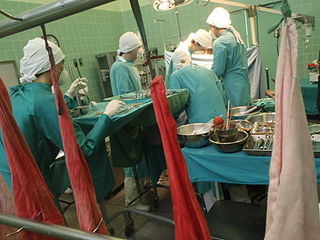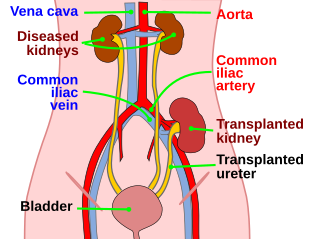
Organ donation is the process when a person allows an organ of their own to be removed and transplanted to another person, legally, either by consent while the donor is alive or dead with the assent of the next of kin.

Organ transplantation is a medical procedure in which an organ is removed from one body and placed in the body of a recipient, to replace a damaged or missing organ. The donor and recipient may be at the same location, or organs may be transported from a donor site to another location. Organs and/or tissues that are transplanted within the same person's body are called autografts. Transplants that are recently performed between two subjects of the same species are called allografts. Allografts can either be from a living or cadaveric source.
The Uniform Anatomical Gift Act (UAGA), and its periodic revisions, is one of the Uniform Acts drafted by the National Conference of Commissioners on Uniform State Laws (NCCUSL), also known as the Uniform Law Commission (ULC), in the United States with the intention of harmonizing state laws between the states.

Kidney transplant or renal transplant is the organ transplant of a kidney into a patient with end-stage kidney disease (ESRD). Kidney transplant is typically classified as deceased-donor or living-donor transplantation depending on the source of the donor organ. Living-donor kidney transplants are further characterized as genetically related (living-related) or non-related (living-unrelated) transplants, depending on whether a biological relationship exists between the donor and recipient.

Body donation, anatomical donation, or body bequest is the donation of a whole body after death for research and education. Donated bodies are mostly used for medical education and research. They are used for gross anatomy, surgical anatomy and for furthering medical education. For years, only medical schools accepted bodies for donation, but now private programs also accept donors. Depending on the program's need for body donation, some programs accept donors with different specifications.

Deaths in Singapore offset the population increase from live births. In 2007, 17,140 people in Singapore died from various causes. The death rate was 4.5 deaths per 1,000 of the population. There are strict regulations surrounding death and treatment of the body after death.

Organ transplantation in China has taken place since the 1960s, and is one of the largest organ transplant programmes in the world, peaking at over 13,000 liver and kidney transplants a year in 2004. Involuntary organ harvesting is illegal under Chinese law; though, under a 1984 regulation, it became legal to remove organs from executed criminals with the prior consent of the criminal or permission of relatives. Growing concerns about possible ethical abuses arising from coerced consent and corruption led medical groups and human rights organizations, by the 1990s, to condemn the practice. These concerns resurfaced in 2001, when a Chinese asylum-seeking doctor testified that he had taken part in organ extraction operations.
Organ procurement is a surgical procedure that removes organs or tissues for reuse, typically for organ transplantation.
Certain fundamental Jewish law questions arise in issues of organ donation. Donation of an organ from a living person to save another's life, where the donor's health will not appreciably suffer, is permitted and encouraged in Jewish law. Donation of an organ from a dead person is equally permitted for the same purpose: to save a life. This simple statement of the issue belies, however, the complexity of defining death in Jewish law. Thus, although there are side issues regarding mutilation of the body etc., the primary issue that prevents organ donation from the dead amongst Jews, in many cases, is the definition of death, simply because to take a life-sustaining organ from a person who was still alive would be murder.
Organ trade is the trading of human organs, tissues, or other body products, usually for transplantation. According to the World Health Organization (WHO), organ trade is a commercial transplantation where there is a profit, or transplantations that occur outside of national medical systems. There is a global need or demand for healthy body parts for transplantation, which exceeds the numbers available.
Transplantable organs and tissues may both refer to organs and tissues that are relatively often or routinely transplanted, as well as relatively seldom transplanted organs and tissues and ones on the experimental stage.
In December 2006, The UK Government set up the Organ Donation Taskforce to identify barriers to organ donation and recommend actions needed to increase organ donation and procurement within the current legal framework.
Organ transplantation in Israel has historically been low compared to other Western countries due to a common belief that organ donation is prohibited under Jewish law. This changed with the passage of new organ donation laws in 2008. If two patients have the same medical need, priority will now go to the patient who has signed an organ donor card, or whose family members have donated an organ. This policy was nicknamed don't give, don't get. The law also defines "brain death" as an indication of death for all legal purposes, including organ donation. Additionally the law provides financial reimbursement to living donors for medical expenses due to donation and lost time at work. Organ trafficking is explicitly banned. Health insurance plans can no longer reimburse patients who go abroad to receive transplants.
Many different major religious groups and denominations have varying views on organ donation of a deceased and live bodies, depending on their ideologies. Differing opinions can arise depending on if the death is categorized as brain death or cease of the heartbeat. It is important for doctors and health care providers to be knowledgeable about differentiating theological and cultural views on death and organ donations as nations are becoming more multicultural.
A beating heart cadaver is a body that is pronounced dead in all medical and legal definitions, connected to a medical ventilator, and retains cardio-pulmonary functions. This keeps the organs of the body, including the heart, functioning and alive. As a result, the period of time in which the organs may be used for transplantation is extended. The heart contains pacemaker cells that will cause it to continue beating even when a patient is brain-dead. Other organs in the body do not have this capability and need the brain to be functioning to send signals to the organs to carry out their functions. A beating heart cadaver requires a ventilator to provide oxygen to its blood, but the heart will continue to beat on its own even in the absence of brain activity. This allows organs to be preserved for a longer period of time in the case of a transplant or donation. A small number of cases in recent years indicate that it can also be implemented for a brain-dead pregnant woman to reach the full term of her pregnancy. There is an advantage to beating heart cadaver organ donation because doctors are able to see the vitals of the organs and tell if they are stable and functioning before transplanting to an ailing patient. This is not possible in a donation from someone pronounced dead.

MOHAN Foundation is a not-for-profit, registered non-government charity organisation in India that works in the field of deceased organ donation and transplantation. MOHAN is an acronym for Multi Organ Harvesting Aid Network. It has offices in Chennai, Hyderabad, Bengaluru, Delhi, Mumbai, Chandigarh, Nagpur, Jaipur and information centers at Kerala and Imphal.
There have been allegations of forced organ harvesting from Falun Gong practitioners and other political prisoners in China. According to a controversial report by former lawmaker David Kilgour, human rights lawyer David Matas and Ethan Gutmann of the US government think tank Victims of Communism Memorial Foundation, political prisoners, mainly Falun Gong practitioners, are being executed "on demand" in order to provide organs for transplant to recipients. Research undertaken by the Washington Post has contradicted these allegations, by showing that China does not import sufficient quantities of immunosuppressant drugs, used by transplant recipients, to carry out the alleged organ harvesting.
Organ donation is when a person gives their organs after they die to someone in need of new organs. Transplantation is the process of transplanting the organs donated into another person. This process extends the life expectancy of a person suffering from organ failure. Unfortunately the number of patients requiring organ transplants outweighs the number of donor organs available.
Organ transplantation in the Indian state of Tamil Nadu is regulated by India's Transplantation of Human Organs Act, 1994 and is facilitated by the Transplant Authority of Tamil Nadu (TRANSTAN) of the Government of Tamil Nadu and several NGOs. Tamil Nadu ranks first in India in deceased organ donation rate at 1.8 per million population, which is seven times higher than the national average.
Organ donation in India is regulated by the Transplantation of Human Organs and Tissues Act, 1994. The law allows both deceased and living donors to donate their organs. It also identifies brain death as a form of death. The National Organ and Tissue Transplant Organisation (NOTTO) functions as the apex body for activities of relating to procurement, allotment and distribution of organs in the country.








